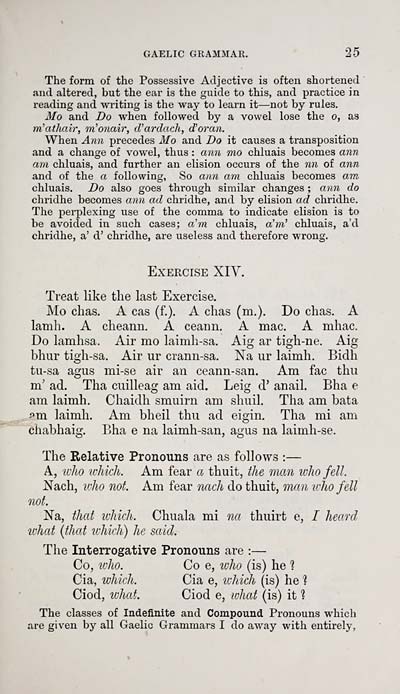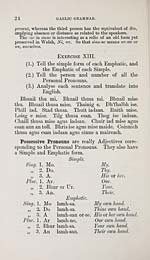Download files
Complete book:
Individual page:
Thumbnail gallery: Grid view | List view

GAELIC GRAMMAR. 25
The form of the Possessive Adjective is often shortened
and altered, but the ear is the guide to this, and practice in
reading and writing is the way to learn it — not by rules.
Mo and Do when followed by a vowel lose the o, as
m'athair, m'onair, d'ardach, d'oran.
When Ann precedes Mo and Do it causes a transposition
and a change of vowel, thus : ann mo chluais becomes aim
am chluais, and further an elision occurs of the nn of ann
and of the a following, So ann am chluais becomes am
chluais. Do also goes through similar changes ; ann do
chridhe becomes ann ad chridhe, and by elision ad chridhe.
The perplexing use of the comma to indicate elision is to
be avoided in such cases; a'm chluais, a'/Ti' chluais, a'd
chridhe, a' d' chridhe, are useless and therefore wrong.
Exercise XIV.
Treat like the last Exercise.
Mo chas. A cas (f.). A chas (m.). Do chas. A
lamh. A clieann. A ceaun. A mac. A mhac.
Do lamlisa. Air mo laimh-sa. Aig ar tigh-ne. Aig
bliur tigh-sa. Air ur crann-sa. Na ur laimh. Bidh
tu-sa agus mi-se air an ceann-san. Am fac thu
m' ad. Tha cuilleag am aid. Leig d' anail. Bha e
am laimh. Chaidh smuirn am shuil. Tha am bata
-''m laimh. Am bheil thu ad eigin. Tha mi am
chabhaig. Bha e na laimh-san, agus na laimh-se.
The Relative Pronouns are as follows : —
A, who which. Am fear a thuit, the man ivho fell.
Nach, ivho not. Am fear nach do thuit, 7na)b who fell
not.
Na, that which. Chuala mi na thuirt e, / heard^
tohat (that ichlch) he said.
The Interrogative Pronouns are : —
Co, ivho. Co e, ivho (is) he 1
Cia, which. Cia e, which (is) he 1
Ciod, what. Ciod e, what (is) it ?
The classes of Indefinite and Compound Pronouns which
are given by all Gaelic Grammars I do away with entirely.
The form of the Possessive Adjective is often shortened
and altered, but the ear is the guide to this, and practice in
reading and writing is the way to learn it — not by rules.
Mo and Do when followed by a vowel lose the o, as
m'athair, m'onair, d'ardach, d'oran.
When Ann precedes Mo and Do it causes a transposition
and a change of vowel, thus : ann mo chluais becomes aim
am chluais, and further an elision occurs of the nn of ann
and of the a following, So ann am chluais becomes am
chluais. Do also goes through similar changes ; ann do
chridhe becomes ann ad chridhe, and by elision ad chridhe.
The perplexing use of the comma to indicate elision is to
be avoided in such cases; a'm chluais, a'/Ti' chluais, a'd
chridhe, a' d' chridhe, are useless and therefore wrong.
Exercise XIV.
Treat like the last Exercise.
Mo chas. A cas (f.). A chas (m.). Do chas. A
lamh. A clieann. A ceaun. A mac. A mhac.
Do lamlisa. Air mo laimh-sa. Aig ar tigh-ne. Aig
bliur tigh-sa. Air ur crann-sa. Na ur laimh. Bidh
tu-sa agus mi-se air an ceann-san. Am fac thu
m' ad. Tha cuilleag am aid. Leig d' anail. Bha e
am laimh. Chaidh smuirn am shuil. Tha am bata
-''m laimh. Am bheil thu ad eigin. Tha mi am
chabhaig. Bha e na laimh-san, agus na laimh-se.
The Relative Pronouns are as follows : —
A, who which. Am fear a thuit, the man ivho fell.
Nach, ivho not. Am fear nach do thuit, 7na)b who fell
not.
Na, that which. Chuala mi na thuirt e, / heard^
tohat (that ichlch) he said.
The Interrogative Pronouns are : —
Co, ivho. Co e, ivho (is) he 1
Cia, which. Cia e, which (is) he 1
Ciod, what. Ciod e, what (is) it ?
The classes of Indefinite and Compound Pronouns which
are given by all Gaelic Grammars I do away with entirely.
Set display mode to: Large image | Transcription
Images and transcriptions on this page, including medium image downloads, may be used under the Creative Commons Attribution 4.0 International Licence unless otherwise stated. ![]()
| Early Gaelic Book Collections > Blair Collection > Gaelic texts for schools > (27) |
|---|
| Permanent URL | https://digital.nls.uk/79350707 |
|---|
| Description | A selection of books from a collection of more than 500 titles, mostly on religious and literary topics. Also includes some material dealing with other Celtic languages and societies. Collection created towards the end of the 19th century by Lady Evelyn Stewart Murray. |
|---|
| Description | Selected items from five 'Special and Named Printed Collections'. Includes books in Gaelic and other Celtic languages, works about the Gaels, their languages, literature, culture and history. |
|---|

